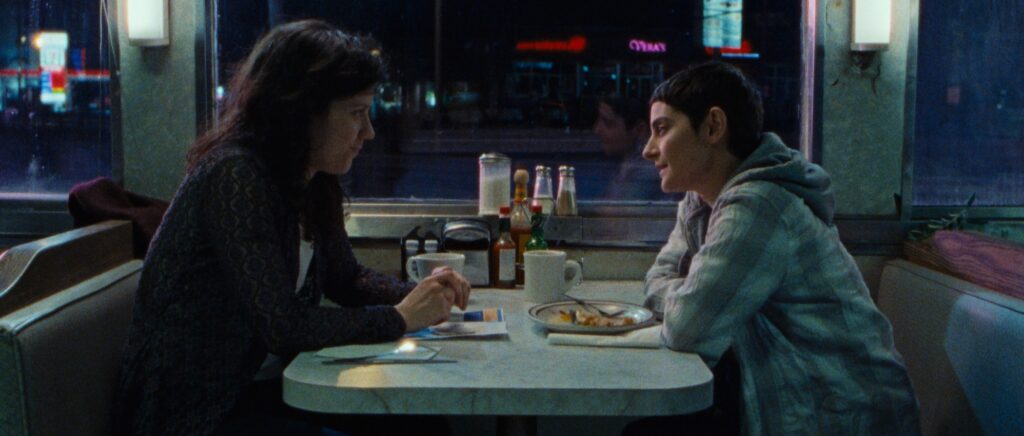While ‘Glazer’ Is Imperfect, the Debut Feature Introduces Us to Two Scrappy Talents Worth Watching
Ryan J. Sloan and his co-writer and lead actress, Ariella Mastroianni, cite Carol Reed’s ‘The Third Man,’ Francis Ford Coppola’s ‘The Conversation,’ and Lee Dang Chong’s ‘Burning’ as their inspirations.

Ryan J. Sloan’s “Gazer” is an imperfect movie that should be given the time of day. A low-budget venture filmed during nights and weekends over the course of two years, Mr. Sloan’s debut feature is a variation on the paranoid thriller, a genre in which a lone protagonist is confronted by circumstances that call into question the basic nature of reality. Power and money, whether in the form of a corporate entity or a governmental institution, often figures into it, as does a level of narrative disjunction.
Mr. Sloan and his co-writer and lead actress, Ariella Mastroianni, make no bones about their inspirations, citing Carol Reed’s “The Third Man” (1949), Francis Ford Coppola’s “The Conversation” (1974), and Lee Dang Chong’s “Burning” (2018). Ridley Scott’s “Alien” (1979) or, rather, its last-woman-standing, Ellen Ripley, is given a shout out, as is a British neurologist, Oliver Sacks. The latter’s 1985 book, “The Man Who Mistook His Wife For a Hat,” deepened Ms. Mastroianni’s interest in the fallibilities of recognition and memory.
Ms. Mastroianni plays the pixieish Frankie Rhodes, a young mother struggling to make ends meet at the shabbier backways of Newark, New Jersey. Her inability to hold on to a job is exacerbated by dyschronometria, a condition that impairs an individual’s ability to register the passage of time. Although Frankie consults with medical professionals, her chief means of coping is a portable cassette player and an array of self-recorded tapes that help her to get to Point B from Point A. As a means to avoid “zoning out,” this method isn’t perfect but it gets the job done.
While wandering the streets at night — daylight being a rare commodity in “Gazer” — Frankie witnesses an event in the window of a nondescript apartment building. Two people are arguing at top volume, a confrontation that leads to an apparent assault. A tall young woman subsequently strides out of the entrance, sees Frankie, gives a sharp look, and then goes on her way. This isn’t the last we’ll see of Paige Foster (Renee Gagner).

Within a few days, the two women meet at a suicide support group. Frankie has been attending these meetings since the death of her husband, an event we see through a series of fractured and increasingly surreal dream sequences. If these nightmares weren’t enough to endure, Frankie is also butting heads with her mother-in-law Diane (Marianne Goodell). All the while, Frankie is trying to drum up some cash in order to realize a vague plan to regain custody of her daughter.
A lot of things are vague in the world of “Gazer.” Frankie and Paige agree to meet at a local diner for a cup of coffee, whereupon Paige relates a story of a controlling brother and the attempts to escape his abusive dominion. The trouble is that the keys to Paige’s car have been left inside the brother’s apartment. Wise to Frankie’s need for cash, Paige offers her $3,000 to break in, retrieve the keys, and make off with the car. After which almost everything that could go wrong does go wrong.
Ms. Mastroianni brings a wiry tension to her performance and cinematographer Matheos Bastos endows the proceedings with an appropriate patina of grit. The convolutions of the plot bring to mind Rudolph Maté’s “D.O.A.” (1950), another story of desperation and redemption whose twists, turns, and byways start off with a nail-biting flourish and then become congested and cluttered. So it is with Mr. Sloan’s film.
At close to two hours, “Gazer” will begin to test the patience of even the most generous of movie-goers: A tighter edit would have done wonders. Still, it would be rash to bet against the two scrappy talents at the center of this venture. They have better things ahead of them.

